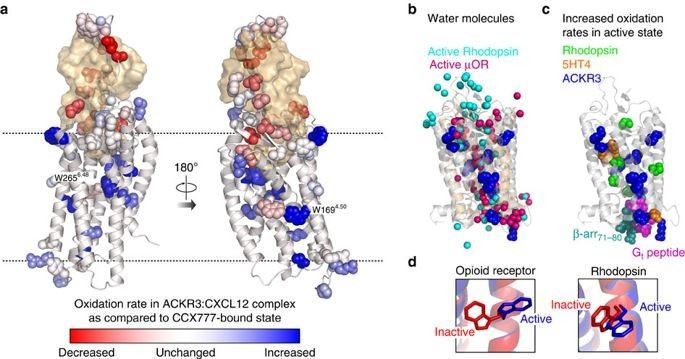ACKR3, previously known as receptor dog cDNA 1 (RDC-1), was recently renamed atypical chemokine receptor 3. The protein is predicted to be a seven transmembrane protein. ACKR3 is widely expressed in the hematopoietic system, heart, vascular endothelial cells, bone, kidney, and brain. ACKR3 acts as a receptor for chemokines CXCL11 and CXCL12/SDF1. The C terminus of ACKR3 is reported to influence the ligand-uptake/degradation rate, G protein coupling, and receptor stability. NF-κB is necessary for the high expression of ACKR3 and is recruited to the proximal promoter of the ACKR3 gene.
| Basic Information of ACKR3 | |
| Protein Name | Atypical chemokine receptor 3 |
| Gene Name | ACKR3, CMKOR1, CXCR7, GPR159, RDC1 |
| Aliases | C-X-C chemokine receptor type 7 (CXC-R7, CXCR-7), Chemokine orphan receptor 1, G-protein coupled receptor 159, G-protein coupled receptor RDC1 homolog (RDC-1) |
| Organism | Homo sapiens (Human) |
| UniProt ID | P25106 |
| Transmembrane Times | 7 |
| Length (aa) | 362 |
| Sequence | MDLHLFDYSEPGNFSDISWPCNSSDCIVVDTVMCPNMPNKSVLLYTLSFIYIFIFVIGMIANSVVVWVNIQAKTTGYDTHCYILNLAIADLWVVLTIPVWVVSLVQHNQWPMGELTCKVTHLIFSINLFGSIFFLTCMSVDRYLSITYFTNTPSSRKKMVRRVVCILVWLLAFCVSLPDTYYLKTVTSASNNETYCRSFYPEHSIKEWLIGMELVSVVLGFAVPFSIIAVFYFLLARAISASSDQEKHSSRKIIFSYVVVFLVCWLPYHVAVLLDIFSILHYIPFTCRLEHALFTALHVTQCLSLVHCCVNPVLYSFINRNYRYELMKAFIFKYSAKTGLTKLIDASRVSETEYSALEQSTK |
ACKR3 may be involved in G-protein coupled receptor protein signaling pathway, and play roles in the pathobiological process including cell growth, survival, adhesion, tumor growth. ACKR3 can act as a coreceptor with CXCR4 to regulate its protein levels in migrating interneurons, thereby adapting their chemokine responsiveness. In glioma cells, ACKR3 transduces signals via the MEK/ERK pathway, mediating resistance to apoptosis. In normal hematopoietic progenitor cells, ACKR3 is not involved in cell migration, adhesion or proliferation; but it can be activated by CXCL11 in malignant blood cells, leading to phosphorylation of erk1/2 (MAPK3/MAPK1), enhancing cell adhesion and migration. ACKR3 promotes the initiation and progression of diseases including cancer and autoimmunity, suggesting its potential as a good therapeutic target.
 Fig.1 Activation of ACKR3 probed by radiolytic footprinting. (Evans, 2017)
Fig.1 Activation of ACKR3 probed by radiolytic footprinting. (Evans, 2017)
This article finds that CXCR4 and ACKR3 have the potential to be broadly useful therapeutics because of their roles in many diseases, including cancer, inflammatory diseases, and AIDS.
This article suggests that ACKR3 plays a direct role in tumorigenesis, but more studies are needed to confirm that ACKR3 contributes to virus-related carcinogenesis in vivo.
This article suggests that a CXCR7 antagonist during demyelination is beneficial not only in the context of repair, but also during immune-mediated CNS injury, while leaving immune cell function largely intact.
This article reveals that ACKR3 regulates its availability and activity to human receptors, thus potentially controlling its role in hpv-8 infection.
This article suggests IBC cells are an excellent tool for both in vitro and in vivo investigations concerning the roles of the CXCL12-CXCR4/ACKR3 axis in IBC migration, growth, and invasion.
Membrane protein studies have advanced significantly over the past few years. Based on our versatile Magic™ membrane protein production platform, we could offer a series of membrane protein preparation services for worldwide customers in reconstitution forms as well as multiple active formats. Aided by our versatile Magic™ anti-membrane protein antibody discovery platform, we also provide customized anti-ACKR3 antibody development services.
Creative Biolabs has successfully generated many functional membrane proteins with multiple active formats for our global customers. We are happy to accelerate the development of our clients’ programs with our one-stop, custom-oriented service. For more detailed information, please feel free to contact us.
Reference
All listed services and products are For Research Use Only. Do Not use in any diagnostic or therapeutic applications.